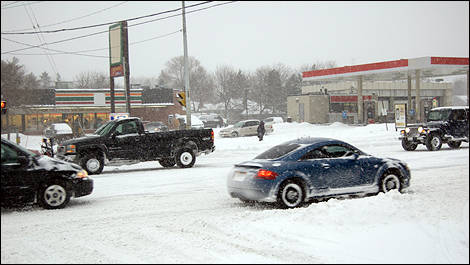We, Canadians, live in a fairly harsh climate with temperatures dropping from plus to minus in just a couple of weeks and weather conditions alternating between rain, hail, snow, sleet and ice. Drivers and their cars need to adapt and rely on the proper equipment at all times.
As the only contact point between the road and your vehicle, your tires can play a vital role in deciding between life and death. Right now, only the province of Quebec has made winter tires mandatory during a certain part of the year, starting December 15.
A lot of people don't realize or understand the value of riding on winter tires since the vast majority of new cars and trucks are sold with all-season tires and a wide selection is available on the market.
A matter of grip
Winter tires use a more flexible compound that's specifically designed to work at lower temperatures and prevent snow buildup in the grooves, resulting in superior grip. The larger and grippier the contact patch is, the better your vehicle will hold on to the road, regardless if it's covered in ice or snow.
If you've ever driven under the rain with tires so worn out that the grooves had basically vanished, then you certainly know what aquaplaning is. The same applies during winter. With a cold-hardened compound and snow easily building up in the grooves, your tires are not likely to help you maintain control.
All-season tires fail to deliver optimum performance in some driving conditions. Unlike winter tires, their grooves can't handle a significant amount of snow and their rubber quickly stiffens as temperatures drop. You can obviously make a case for all-season tires in places like Vancouver, where you stand more chances of running into a rainstorm than a snowstorm.
As the only contact point between the road and your vehicle, your tires can play a vital role in deciding between life and death. Right now, only the province of Quebec has made winter tires mandatory during a certain part of the year, starting December 15.
A lot of people don't realize or understand the value of riding on winter tires since the vast majority of new cars and trucks are sold with all-season tires and a wide selection is available on the market.
 |
| Photo: Thinkstock |
A matter of grip
Winter tires use a more flexible compound that's specifically designed to work at lower temperatures and prevent snow buildup in the grooves, resulting in superior grip. The larger and grippier the contact patch is, the better your vehicle will hold on to the road, regardless if it's covered in ice or snow.
If you've ever driven under the rain with tires so worn out that the grooves had basically vanished, then you certainly know what aquaplaning is. The same applies during winter. With a cold-hardened compound and snow easily building up in the grooves, your tires are not likely to help you maintain control.
All-season tires fail to deliver optimum performance in some driving conditions. Unlike winter tires, their grooves can't handle a significant amount of snow and their rubber quickly stiffens as temperatures drop. You can obviously make a case for all-season tires in places like Vancouver, where you stand more chances of running into a rainstorm than a snowstorm.


